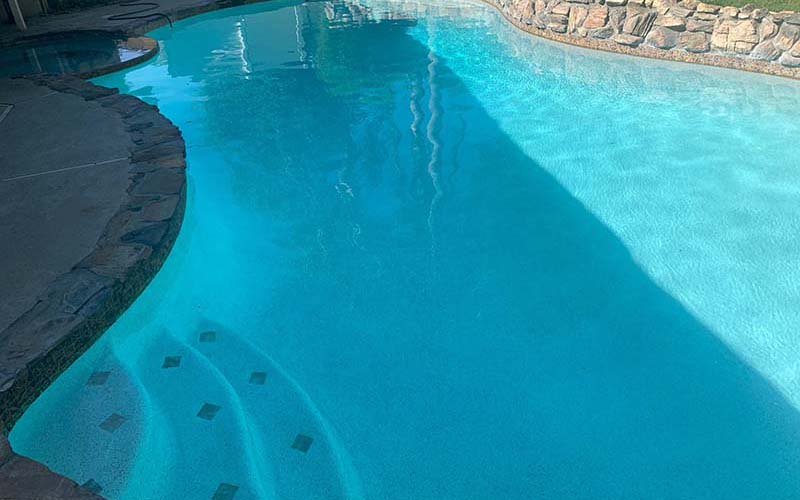
Saltwater vs Chlorine Pool: Which One Is Right for You?
When choosing between a saltwater vs chlorine pool, understanding the differences is essential. Each type has its unique benefits and challenges. Pools are an investment, and selecting the right one ensures you’ll enjoy it for years to come.
But how do you decide which is best for you? A clear understanding of costs, maintenance, comfort, and long-term impact can make the decision easier. Whether you want low upkeep or prioritize a specific water feel, this guide will help you choose wisely.
Understanding the Basics of Saltwater vs Chlorine Pool
What Is a Saltwater Pool?
Saltwater pools are a modern option that’s becoming increasingly popular. These pools use a salt chlorine generator to sanitize the water, converting salt into chlorine through a process called electrolysis. Unlike traditional chlorine pools, saltwater pools don’t require you to add chlorine manually. The chlorine levels in these pools are much lower, resulting in water that feels softer and gentler on the skin.
Additionally, saltwater pools are praised for their ease of maintenance. The generator handles most of the sanitization, reducing the need for frequent chemical adjustments. However, the generator does require occasional cleaning to prevent buildup, ensuring it functions properly.
What Is a Chlorine Pool?
Chlorine pools are the traditional choice for pool sanitation. They rely on manually adding chlorine, either in liquid, tablet, or granule form, to kill bacteria, algae, and other contaminants. This method has been used for decades and is highly effective at maintaining clean and safe pool water.
Chlorine pools are often more affordable upfront, making them a practical choice for many homeowners. However, they do require more frequent maintenance, including regular testing and chemical balancing, to keep the water safe and clear.
Key Differences Between Saltwater and Chlorine Pools
Installation and Upfront Costs
When comparing installation costs, saltwater pools generally require a higher initial investment. The salt chlorine generator is an essential component that adds to the upfront expense. However, this system reduces the need for ongoing chemical purchases, potentially saving money in the long run.
In contrast, chlorine pools have a lower installation cost since they don’t require specialized equipment. However, the regular cost of purchasing chlorine and other maintenance supplies can add up over time.
Maintenance Requirements
Saltwater pools are often seen as low-maintenance compared to chlorine pools. The generator continuously produces chlorine, keeping the water clean with minimal effort. That said, the system still requires occasional cleaning and monitoring to prevent buildup.
Chlorine pools demand more frequent attention. Homeowners must regularly test and adjust chemical levels, including pH and chlorine, to maintain water balance. While this can be time-consuming, it allows for precise control over the pool’s sanitation.
Health and Comfort: Saltwater vs Chlorine Pool
Skin and Eye Sensitivity
One of the most significant advantages of saltwater pools is their gentler impact on the skin and eyes. The lower chlorine levels result in softer water, reducing the likelihood of irritation. This makes saltwater pools an excellent choice for families with children or individuals with sensitive skin.
Chlorine pools, while effective at sanitation, can sometimes cause redness or dryness, especially if the chemical balance is off. Proper maintenance can mitigate these effects, but some swimmers may still prefer the comfort of saltwater.
Water Quality and Smell
Saltwater pools are often praised for their smooth, natural feel. They also lack the strong chemical odor commonly associated with traditional chlorine pools. This makes swimming a more pleasant experience for many people.
Chlorine pools, on the other hand, are known for their distinct smell, which some find off-putting. However, the scent is often a sign of effective sanitation, ensuring the pool is free from harmful bacteria.
Environmental Impact of Saltwater vs Chlorine Pool
Sustainability Considerations
For environmentally conscious homeowners, the sustainability of their pool is an important factor. Saltwater pools rely less on chemical additives, making them a more eco-friendly option. However, the salt chlorine generator uses electricity, which can increase energy consumption.
Chlorine pools, while less energy-intensive, depend heavily on chemical production and distribution. This reliance on chemicals may not align with eco-friendly goals.
Long-Term Effects on Equipment and Surroundings
Saltwater’s corrosive properties can affect metal components and pool accessories over time. Proper maintenance, such as using corrosion-resistant materials, can help mitigate this issue. Chlorine pools don’t pose the same risk, but careful handling of chemicals is essential to prevent damage to the surrounding environment.
Choosing the Right Pool for Your Lifestyle
Budget and Long-Term Costs
When considering your budget, think about both upfront and long-term expenses. Saltwater pools require a larger initial investment due to the generator, but the reduced need for chlorine can save money in the long run. Chlorine pools are less expensive to install but come with recurring costs for chemicals and maintenance supplies.
Time Commitment for Maintenance
Your available time for pool maintenance is another important consideration. Saltwater pools are less time-intensive, as the generator handles much of the work. However, they still require occasional checks to ensure everything is running smoothly. Chlorine pools demand more frequent attention, including regular testing and chemical adjustments, which may not suit everyone’s schedule.
Personal Preferences
Ultimately, the choice between a saltwater and chlorine pool comes down to personal preferences. Do you prefer softer water and lower maintenance? Or do you prioritize affordability and proven effectiveness? Assessing your needs and priorities will help you make the best decision for your pool.
Final Thoughts on Saltwater vs Chlorine Pool
Choosing between a saltwater vs chlorine pool doesn’t have to be overwhelming. Both options offer unique benefits and challenges, so the best choice depends on your budget, maintenance preferences, and lifestyle. Whether you’re drawn to the gentler experience of a saltwater pool or the tried-and-true method of a chlorine pool, your backyard oasis is within reach.
Contact us today to discuss your pool needs, ask questions, or schedule a consultation. Let us help you create the perfect pool for your home!




